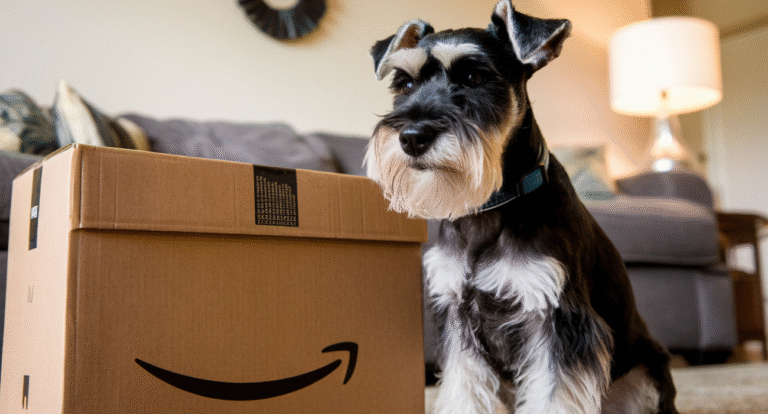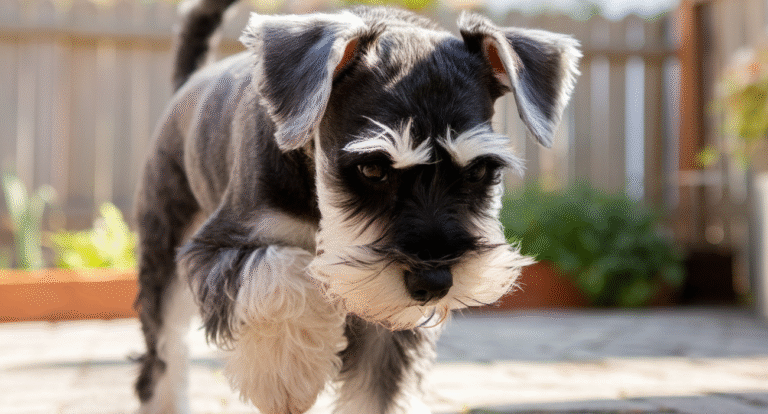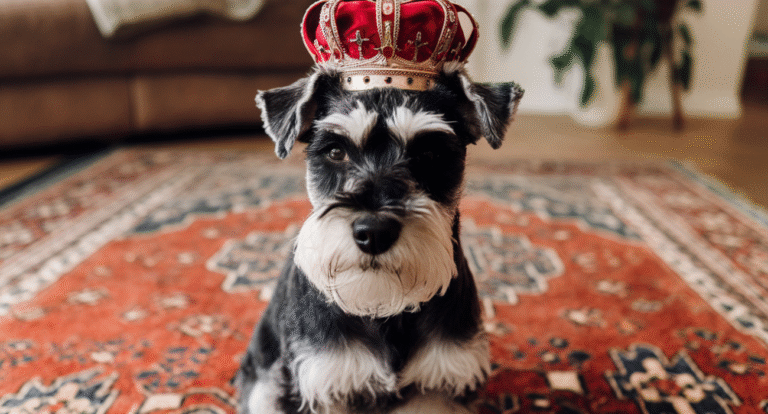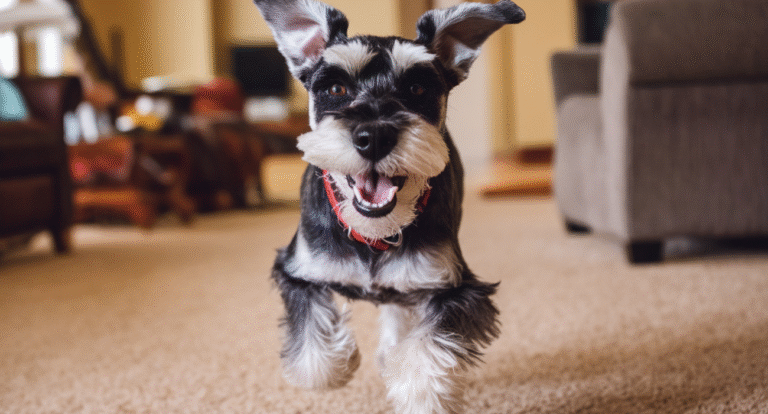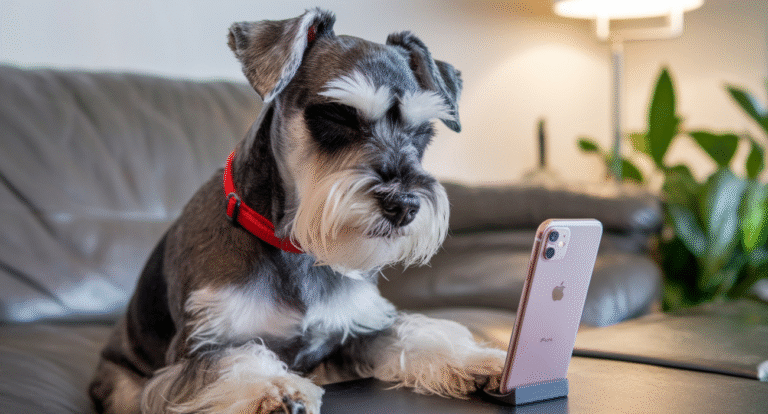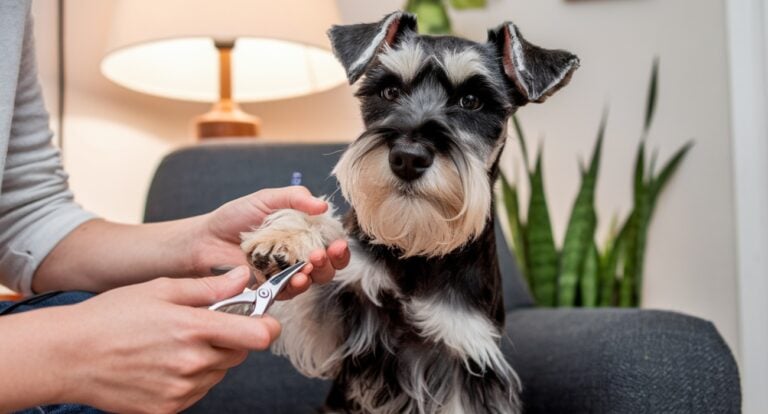Master the art of training your miniature schnauzer with this comprehensive seven-day guide. Unlock professional techniques and tips to nurture a well-behaved and obedient furry companion.
As you begin the journey of raising your Miniature Schnauzer, you’ll discover that patience is crucial in nurturing a well-behaved companion.
Training your energetic little friend doesn’t have to be a difficult task. By following a structured guide, you can establish a solid foundation in just one week, ensuring that your pup learns basic commands, becomes housebroken, and develops good leash manners.
Addressing behavioral quirks may seem challenging, but this guide promises to provide you with effective strategies to tackle even the most difficult habits.
Stick to the plan, and you’ll soon witness a transformation that will strengthen your bond and create a lifetime of mutual respect and understanding.
So, what’s the secret to shaping your Miniature Schnauzer into a well-behaved and happy family member? The answer is just around the corner as you learn to train your pup like a pro.
Day 1: Get To Know Your Miniature Schnauzer

Before learning the training techniques, it is important to comprehend the spirited personality and keen intelligence of your Miniature Schnauzer.
This breed is full of energy and curiosity, so you must be prepared to keep up. The Miniature Schnauzer is renowned for its bright and alert nature. It is not just a small dog with a loud bark; it is a small but powerful dog with intelligence to match.
You will discover that your Schnauzer is eager to learn and responds well to consistent, positive reinforcement. They are quick learners, so you will not have to repeat yourself too many times before they understand.
However, their intelligence comes with a caveat. If you do not provide enough mental stimulation, they will find their own entertainment, which may not align with your preferences.
Training a Miniature Schnauzer is not just about physical exercise; it also involves mental stimulation. They are natural problem solvers and thrive on tasks that challenge their brains.
You need to keep the training sessions interesting and varied, always staying one step ahead. Additionally, it is important to establish yourself as the pack leader right from the beginning, as this breed can be headstrong and assertive.
So with all that said, your job for day 1 is simple: Load up on training treats!
Day 2: Establishing Basic Commands

Once you understand your Miniature Schnauzer’s personality, it’s time to establish obedience with basic commands like ‘sit’, ‘stay’, and ‘come’.
These commands are not just tricks; they are crucial for your dog’s safety and your peace of mind. By mastering these commands, your Miniature Schnauzer will learn to look to you for guidance, reinforcing your role as the pack leader.
Here’s how to teach each command:
Sit
- Hold a treat close to your dog’s nose.
- Move your hand up, allowing their head to follow the treat and causing their bottom to lower.
- Once they are in the sitting position, say ‘Sit,’ give them the treat, and show affection.
Stay
- Ask your dog to ‘Sit.’
- Open your palm in front of you and say ‘Stay.’
- Take a few steps back. If they stay, reward them with a treat and affection.
- Gradually increase the number of steps before giving the treat.
Come
- Put a leash and collar on your dog.
- Go down to their level and say ‘Come,’ while gently pulling on the leash.
- When they reach you, reward them with affection and a treat.
Day 3: Mastering House Training

To successfully house train your Miniature Schnauzer, it’s important to be patient and consistent. Establishing a routine that both you and your pup can stick to is key.
Potty Training
Start by choosing a specific spot outside where you want your dog to do their business. Take your Schnauzer there regularly, especially after meals, naps, and play sessions.
When they go in the right place, praise them enthusiastically and offer a treat. This positive reinforcement will encourage them to repeat the behavior.
Learn to recognize your dog’s signals that indicate they need to go out. Watch for signs like sniffing, circling, or whining, and immediately take them to their designated spot.
If an accident happens indoors, avoid scolding them harshly. Instead, clean it up without making a fuss and be more vigilant about catching their cues next time. Remember, the goal is to guide, not punish.
Stick to a consistent feeding schedule, as this will help regulate your pup’s bathroom habits.
Feeding your Schnauzer at the same times each day will make their elimination pattern more predictable and easier for you to manage. Additionally, limit their water intake before bedtime to reduce the likelihood of nighttime accidents.
Crate Training
Crate training can be a useful tool in house training. Dogs generally prefer not to soil their sleeping area, so a crate can encourage your Schnauzer to hold it until you can take them outside.
Just ensure that the crate is the appropriate size—not too big or too small—and that it provides a comfortable, positive space for your dog.
By following these steps and being patient, you’ll have your Miniature Schnauzer house trained in no time.
Day 4: Socializing Your Schnauzer

To ensure your Miniature Schnauzer becomes a confident and well-adjusted companion, it’s essential to start socialization early, exposing them to a variety of people, animals, and environments.
Socialization helps prevent fearfulness and aggression, ensuring they’re comfortable in different situations. Here’s how you can effectively socialize your Schnauzer:
Introduce them to new people and animals
- Regularly invite friends over so your pup can meet a range of individuals, including children.
- Arrange playdates with other vaccinated dogs to help them build their social skills.
Expose them to various environments and experiences
- Take walks in different neighborhoods and parks.
- Bring them along for car rides and outdoor cafes to expose them to new sights and sounds.
Remember, socialization isn’t a one-time event; it’s a continuous process. Keep these points in mind:
- Be positive: Always associate new encounters with positive reinforcement, such as treats or praise.
- Watch their cues: Pay attention to your dog’s body language. If they seem stressed, give them a break and try again later.
Day 5: Leash Training Techniques

After successfully socializing your Miniature Schnauzer, it is important to focus on leash training. This skill is crucial for safe and enjoyable walks.
To start, make sure your pup has a comfortable collar or harness and a lightweight leash. Allow your dog to wear the collar or harness around the house to become accustomed to it.
Begin leash training in a distraction-free area, such as your backyard. Attach the leash and let your Schnauzer explore freely with it dragging behind. This will help your dog get used to the presence of the leash without feeling any pressure.
Once they are comfortable, pick up the leash and follow your pup around. Offer treats and praise to create positive associations.
Now, it is time to teach your Schnauzer to walk beside you. Hold the leash with a little slack and encourage them to walk beside you using treats and verbal cues. If they pull ahead or tug, stop walking and wait.
Avoid yanking the leash. Instead, when your Schnauzer looks back or returns to you, reward that behavior. This will teach them that walking calmly by your side is beneficial.
As your Miniature Schnauzer learns, gradually introduce more distractions. Practice walking in different environments, such as quiet streets or parks. If they remain focused on you despite the distractions, you are on the right track.
Day 6: Addressing Behavioral Issues

Barking or jumping are two major behavior issues with miniature schnauzers. While Schnauzers are known for their spunky personalities, it’s important to provide proper guidance to prevent unwanted behaviors from becoming ingrained habits.
Consistency is key when correcting behaviors. Here’s a structured approach:
Barking
Schnauzers may bark for attention or due to perceived threats.
- Identify the trigger: Determine if it’s boredom, a passerby, or another dog.
- Redirect the behavior: Engage your pup in a quiet activity, like a puzzle toy.
- Teach the ‘Quiet’ command: Reward your Schnauzer when they stop barking on command.
Jumping
Jumping is often a way to greet or seek attention.
- Ignore the jumping: Turn your back and avoid eye contact until all four paws are on the ground.
- Positive reinforcement: Once your dog is sitting or standing calmly, give them attention and treats.
When dealing with these issues, avoid yelling or physical punishment, as it can lead to fear and aggression. Instead, focus on positive reinforcement and patience.
If a behavior persists or escalates, consider consulting a professional dog trainer or behaviorist. They can provide tailored advice and hands-on assistance to ensure your Miniature Schnauzer becomes the well-behaved companion you know they can be.
With love, consistency, and the right strategies, you’ll be able to tackle these behavioral issues head-on and enjoy a harmonious relationship with your furry friend.
Day 7: Reinforcing Training and Beyond

To maintain and build upon your Miniature Schnauzer’s good behavior, it is crucial to reinforce their training as they continue to develop.
Just like strengthening a muscle through exercise, consistent work on your pup’s training exercises is necessary to ensure they don’t forget what they’ve learned.
Remember, consistency is key. Commit to regular practice sessions, even if they’re brief, to keep your Schnauzer’s skills sharp.
Incorporate training into your daily routine. Ask for a sit before meals or a polite greeting when someone comes to the door. These small reinforcements help your dog understand that good behavior isn’t limited to training sessions—it’s a way of life.
And don’t forget to switch things up! Like you, your Miniature Schnauzer can get bored with the same old drills. Introduce new tricks and challenges to keep their mind engaged.
Positive reinforcement remains your most powerful tool. Treats, praise, and playtime are all excellent rewards for a job well done. However, as your Schnauzer becomes more adept, start phasing out constant treat rewards and replace them with varied forms of praise.
This will prevent them from becoming too dependent on food rewards and will also keep them guessing, making training more exciting for them.
Lastly, never stop learning. Dog training techniques are always evolving, so stay informed about new methods or insights that can help you and your Miniature Schnauzer grow together.
Whether it’s picking up a new book, joining a local training club, or attending workshops, continuing your education will benefit both you and your furry friend. Your Miniature Schnauzer’s training journey is a marathon, not a sprint, so enjoy the process and cherish the bond it creates.

